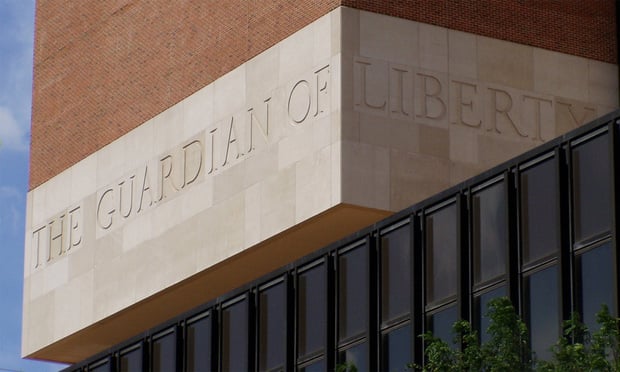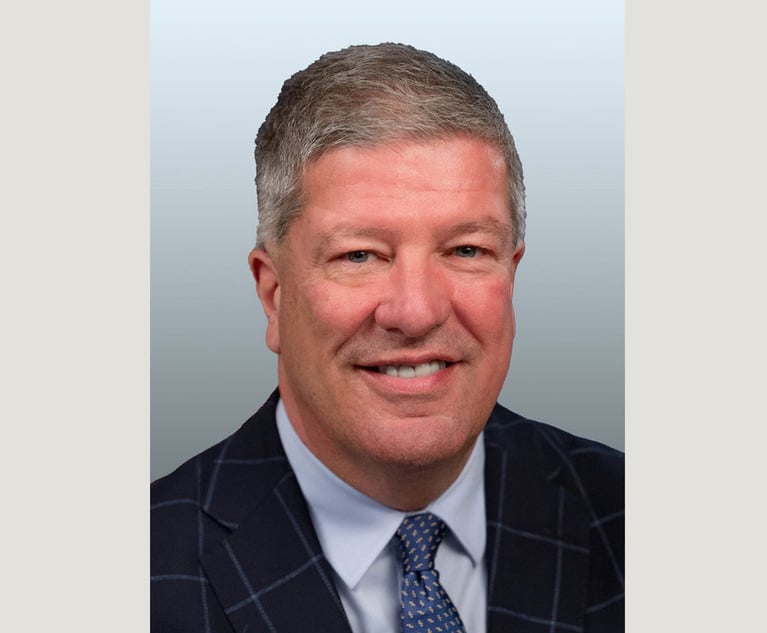Jury Announces Defense Verdict in Phila. DA's Office Detective's Lawsuit Alleging Retaliatory Firing
A jury from the U.S. District Court for the Eastern District of Pennsylvania on Wednesday handed up a defense verdict in the case.
September 27, 2019 at 05:43 PM
5 minute read
 The James A. Byrne Courthouse in Philadelphia. (Photo: Wikipedia)
The James A. Byrne Courthouse in Philadelphia. (Photo: Wikipedia)
and Tiffany Allen
A detective at the Philadelphia District Attorney's Office has failed to convince a federal jury that he was retaliated against for cooperating with the criminal investigation that led former Philadelphia District Attorney R. Seth Williams to plead guilty to taking bribes.
A jury from the U.S. District Court for the Eastern District of Pennsylvania on Wednesday handed up a defense verdict in the case that detective Pierre Gomez brought against Philadelphia, the district attorney and several high-ranking officials in the District Attorney's Office. The verdict was rendered after three days of trial before U.S. District Judge Chad Kenney.
According to court documents, Gomez alleged that County Detective leaders denied Gomez overtime and transferred him from a prestigious assignment to a "career-ending" position because he met with an FBI agent and an IRS agent in connection with the investigation of Williams and had been subpoenaed to testify before the investigating grand jury.
Michael Yanoff, of counsel to Goldstein Law Partners, who represented Gomez, praised his client in a brief interview Friday, and said he respected the jury's decision.
"The jury made its decision, and we respect the jury's decision," he said. "Detective Gomez is a really fine individual, and is one of the good guys, quite frankly."
Yanoff tried the case with Goldstein Law Partners attorney Shawn Rodgers.
Christopher Rider and Tiffany Allen of the Philadelphia Law Department tried the case for the defendants. The office did not provide comment about the case.
Jane Roh, a spokeswoman for the District Attorney's Office, thanked the jury for its finding, and said District Attorney Larry Krasner had pushed to make sure the case went to trial.
"District Attorney Krasner personally requested that this employment discrimination lawsuit be taken to trial, rather than settled using taxpayer dollars," Roh said in an emailed statement. "While this discrimination claim involves events that predate District Attorney Krasner's administration, the known facts of this lawsuit, including that the plaintiff was an at-will employee, strongly indicated the DAO and City of Philadelphia would prevail.
According to Gomez's pretrial memo, the alleged retaliation began after a meeting he had with an FBI agent and an IRS agent in May 2015. Shortly after the meeting, Gomez said, two supervisors contacted him and questioned him about it. The next day, during an in-person meeting with the supervisors, Gomez acknowledged the meeting took place, but refused to disclose details. The supervisors, Gomez said, told him they were going to "send it up the chain [of command]" that he had met with federal authorities. Gomez added in his pretrial memo that, at the time, he felt he was being interrogated.
In early 2016, according to the memo, one of the supervisors attempted to transfer Gomez from the more prestigious Dangerous Drug Offender's Unit to a " career-ending" position at the Private Criminal Complaints Unit. After Gomez raised the issue with the supervisor of the unit, the transfer did not go through.
Gomez was eventually transferred in July 2017, just weeks after Williams pleaded guilty in the midst of trial. In his memo, Gomez said he was told that the Dangerous Drug Offender's Unit was shutting down entirely, however, Gomez contended, that never happened.
Gomez also alleged he was given almost no opportunity to perform overtime in the unit's "wiretap room" in 2017 and 2018, and only performed eight hours over that time period.
Gomez contended that the reasons given for the attempted transfer and eventual transfer were pretextual, and noted that a direct supervisor had said Gomez performed his job in an "exemplary fashion."
Gomez alleged First Amendment retaliation in an attempt to dissuade him from cooperating with the federal investigation, and to punish him for his cooperation. He further alleged violations of the whistleblower law. Along with the economic damages, Gomez also claimed he suffered mental anguish, humiliation and a loss of professional reputation.
In its pretrial memo, the defendants raised issues about Gomez receiving a counseling memo for allegedly failing to ensure that his work-related vehicle had an updated registration, and said that they were able to handle all open wiretaps without needing Gomez's overtime assistance.
Regarding the initial transfer efforts, the defendants contended in their memo that one of Gomez's supervisors did not believe the office was getting sufficient benefit from filling the position Gomez was in.
The memo also contended the reason Gomez was transferred was because there was a need in that unit, and the interim County Detectives chief who made the decision was unaware Gomez had cooperated on the Williams investigation. The memo also said the transfer was partly made out of a belief that, "due to [his] abrasive personality, [Gomez's] interaction with other DAO personnel should be limited."
After deliberating for three and a half hours, the jury rendered a defense verdict.
This content has been archived. It is available through our partners, LexisNexis® and Bloomberg Law.
To view this content, please continue to their sites.
Not a Lexis Subscriber?
Subscribe Now
Not a Bloomberg Law Subscriber?
Subscribe Now
NOT FOR REPRINT
© 2025 ALM Global, LLC, All Rights Reserved. Request academic re-use from www.copyright.com. All other uses, submit a request to [email protected]. For more information visit Asset & Logo Licensing.
You Might Like
View All


Stevens & Lee Hires Ex-Middle District of Pennsylvania U.S. Attorney as White-Collar Co-Chair
3 minute read
Judge Tanks Prevailing Pittsburgh Attorneys' $2.45M Fee Request to $250K
5 minute readTrending Stories
- 1Being a Profession is Not Malarkey
- 2Bring NJ's 'Pretrial Opportunity Program' into the Open
- 3High-Speed Crash With Police Vehicle Nets $1.6 Million Settlement
- 4Embracing a ‘Stronger Together’ Mentality: Collaboration Best Practices for Attorneys
- 5Selling Law. How to Get Hired, Paid and Rehired
Who Got The Work
J. Brugh Lower of Gibbons has entered an appearance for industrial equipment supplier Devco Corporation in a pending trademark infringement lawsuit. The suit, accusing the defendant of selling knock-off Graco products, was filed Dec. 18 in New Jersey District Court by Rivkin Radler on behalf of Graco Inc. and Graco Minnesota. The case, assigned to U.S. District Judge Zahid N. Quraishi, is 3:24-cv-11294, Graco Inc. et al v. Devco Corporation.
Who Got The Work
Rebecca Maller-Stein and Kent A. Yalowitz of Arnold & Porter Kaye Scholer have entered their appearances for Hanaco Venture Capital and its executives, Lior Prosor and David Frankel, in a pending securities lawsuit. The action, filed on Dec. 24 in New York Southern District Court by Zell, Aron & Co. on behalf of Goldeneye Advisors, accuses the defendants of negligently and fraudulently managing the plaintiff's $1 million investment. The case, assigned to U.S. District Judge Vernon S. Broderick, is 1:24-cv-09918, Goldeneye Advisors, LLC v. Hanaco Venture Capital, Ltd. et al.
Who Got The Work
Attorneys from A&O Shearman has stepped in as defense counsel for Toronto-Dominion Bank and other defendants in a pending securities class action. The suit, filed Dec. 11 in New York Southern District Court by Bleichmar Fonti & Auld, accuses the defendants of concealing the bank's 'pervasive' deficiencies in regards to its compliance with the Bank Secrecy Act and the quality of its anti-money laundering controls. The case, assigned to U.S. District Judge Arun Subramanian, is 1:24-cv-09445, Gonzalez v. The Toronto-Dominion Bank et al.
Who Got The Work
Crown Castle International, a Pennsylvania company providing shared communications infrastructure, has turned to Luke D. Wolf of Gordon Rees Scully Mansukhani to fend off a pending breach-of-contract lawsuit. The court action, filed Nov. 25 in Michigan Eastern District Court by Hooper Hathaway PC on behalf of The Town Residences LLC, accuses Crown Castle of failing to transfer approximately $30,000 in utility payments from T-Mobile in breach of a roof-top lease and assignment agreement. The case, assigned to U.S. District Judge Susan K. Declercq, is 2:24-cv-13131, The Town Residences LLC v. T-Mobile US, Inc. et al.
Who Got The Work
Wilfred P. Coronato and Daniel M. Schwartz of McCarter & English have stepped in as defense counsel to Electrolux Home Products Inc. in a pending product liability lawsuit. The court action, filed Nov. 26 in New York Eastern District Court by Poulos Lopiccolo PC and Nagel Rice LLP on behalf of David Stern, alleges that the defendant's refrigerators’ drawers and shelving repeatedly break and fall apart within months after purchase. The case, assigned to U.S. District Judge Joan M. Azrack, is 2:24-cv-08204, Stern v. Electrolux Home Products, Inc.
Featured Firms
Law Offices of Gary Martin Hays & Associates, P.C.
(470) 294-1674
Law Offices of Mark E. Salomone
(857) 444-6468
Smith & Hassler
(713) 739-1250





